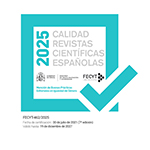Catulo’s translations by José Ángel Valente. 'Versión de Catulo' in 'Nada está escrito', followed by 'Anales de Volusio' in 'El inocente'
Abstract
Approaching other authors through versions has been a writing practice carried out by various writers as a form of both literary exercise and poetic dialogue with the tradition. The aims of this article are the following; first, to put in value the use of the version by José Ángel Valente in his early literary beginnings by analyzing the poem “Catullus Version”, included in his posthumous anthology of poems Nada está escrito (1952-1953); second, to provide arguments to justify this repeated versioning practice in the poem “Anales de Volusio” , a recreation inspired by the carmen XXVII by the poet from Verona included in the seventh poems book of Valente, El inocente (1967-1970). In both cases it can be seen how the poet goes from a close reading of the original to a freer translation.
Downloads
Article download
License
In order to support the global exchange of knowledge, the journal Dicenda. Cuadernos de Filología Hispánica is allowing unrestricted access to its content as from its publication in this electronic edition, and as such it is an open-access journal. The originals published in this journal are the property of the Complutense University of Madrid and any reproduction thereof in full or in part must cite the source. All content is distributed under a Creative Commons Attribution 4.0 use and distribution licence (CC BY 4.0). This circumstance must be expressly stated in these terms where necessary. You can view the summary and the complete legal text of the licence.









